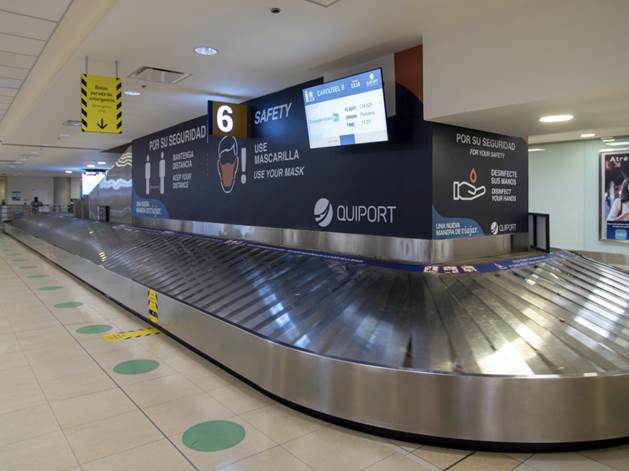Quito Airport renews health and passenger service accreditations

The quality of passenger service is presently one of the fundamental pillars on which the airport industry is erected, and a factor that has gained significant relevance due to the COVID–19 health crisis, which has to do with the way in which airports are taking care of the health of their passengers, as well as of their collaborators.
As such, the Mariscal Sucre International Airport has renewed two important accreditations in 2021 that validate the efforts made to offer its passengers a satisfactory and safe experience in their passage through the air terminal: The Airport Customer Experience Accreditation: level 3 and the Airport Health Accreditation, both granted by the Airports Council International (ACI).
Level 3 in the Airport Customer Experience Accreditation means that Corporación Quiport, as the entity responsible for managing the airport, meets four key conditions:
• Incorporates customer service policies into your overall strategy.
• Knows the profile of its passengers.
• Measures their level of satisfaction.
• Executes improvements and new services considering the real needs of passengers.  “The pandemic has not been an obstacle to continue working to provide our passengers with the best experience at the Quito airport. Knowing what passengers expect from the airport service and measuring their level of satisfaction allows us to plan much more efficiently and guarantee that our efforts will meet their objectives. We have a firm conviction that the success of our work at the Quito airport depends, to a great extent, on working with our passengers in mind,” explained Ramón Miró, president and CEO of Corporación Quiport.
“The pandemic has not been an obstacle to continue working to provide our passengers with the best experience at the Quito airport. Knowing what passengers expect from the airport service and measuring their level of satisfaction allows us to plan much more efficiently and guarantee that our efforts will meet their objectives. We have a firm conviction that the success of our work at the Quito airport depends, to a great extent, on working with our passengers in mind,” explained Ramón Miró, president and CEO of Corporación Quiport.
Currently there are only two airports in the world that have reached level 3: Quito and Hong Kong. Incheon airport, in South Korea, is the sole level 4 certification holder in the world.
On the other hand, Quito airport renewed its ACI Airport Health Accreditation (AHA), which is based on the recommendations of the International Civil Aviation Organization (ICAO) Council to establish common sanitary measures and is aligned with the best practices of ACI, as well as with the aviation security protocol developed by the European Union Aviation Safety Agency (EASA).
Quito airport received this accreditation for the first time in August 2020 and the present renewal will be valid until September 2022.
After an exhaustive evaluation, ACI considers not only that Mariscal Sucre airport complies with all sanitary recommendations, but has also demonstrated an important capacity to adapt biosecurity measures and protocols to the new characteristics of the pandemic to offer increased protection.
Ramón Miró, Quiport’s chief executive, reiterated that this accreditation is very significant for the reactivation of air transport in the country. “We are aware that hygiene and health are two issues that we cannot neglect and that should be part of our strategy in the medium and long term. Air transport is one of the most regulated activities in the world and that has generated in us a culture of permanent self -evaluation. I congratulate the entire Quiport staff that has made it possible for us to have renewed the Airport Sanitary Accreditation until 2022”, he remarked.
The aspects evaluated in the program include cleaning and disinfection, physical distancing (when feasible and practical), protection of airport personnel, physical distribution, communication with passengers and passenger facilities.
All passenger areas and processes are considered, including access to the terminal, check -in areas, security control, boarding gates, lounges, retail stores, food and beverage outlets, boarding bridges, escalators and elevators, immigration control areas and facilities (in collaboration with authorities), baggage drop-off area and departure from the arrivals area.
